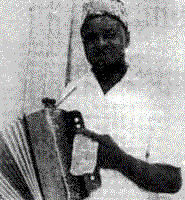

 taken in Kenema in 1969
taken in Kenema in 1969Salia was bitterly disappointed at first, but on the insistence of his father he settled down to playing the accordion "to the warriors and not for Europeans." From then on, Salia took his "education" seriously. Through hard work, determination and an innate poetic talent, he taught himself to play the accordion. Although his father was a renowned accordionist himself, Salia learnt by his own experience. He spoilt many accordions in the process but his father always bought him a new one.
Gradually, Salia's reputation began to spread, first in Mendeland and later all over Sierra Leone. He travelled from place to place entertaining chiefs and people with his stories and songs. After serving several chiefs, he moved to Rotifunk where he was court entertainer to Chief Albert Caulker for some time. After his stay in Rotifunk, he moved to Moyamba to work for the famous Chief Julius Gulama.
Always searching for knowledge and true to the spirit of minstrels, Salia was constantly on the move. He eventually ended up in Freetown where he joined the Sierra Leone Police Force until the outbreak of the Second World War. Up to this day, Salia remembers distinctly that his number in the police force was 377. His police duties did not stop him from playing the accordion.
Salia has composed hundreds of songs and entertained people in all walks of life all over the country. He has been a symbol of the artist in our traditional society, and he has spent all his life trying to establish the fact that there is dignity in art especially indigenous art. He is disappointed that Sierra Leone does not give enough appreciation to the efforts of indigenous artists. But he remains optimistic, and believes that even in his old age, he can still contribute to his art and to the nation's cultural development.
 from: http://www.sierra-leone.org/heroes10.html
from: http://www.sierra-leone.org/heroes10.html
on the Sierra Leone Web
also see: http://nikiibu.wordpress.com/
No comments:
Post a Comment